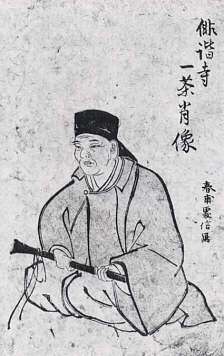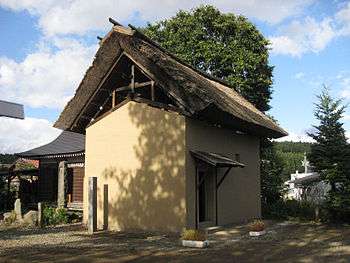Last Days of Issa's Father
The Chichi no Shuen Nikki (父の終焉日記, Chichi no Shūen Nikki) was a diary of Kobayashi Issa, the title referring to the last days of his father. This is said to be the very root of Japan's I novel.

Synopsis
Kobayashi Issa (1763–1828), one of the four great haiku masters of Japan, along with Matsuo Bashō, Yosa Buson and Masaoka Shiki, described the last days of his father in his diary, beginning when his father suddenly developed fever and became seriously ill and continuing until a week after his demise. The weakening father and conflicts between his step-mother, his brother-in-law and him were vividly described in a factual manner. However, the diary was intended for publication, and thus had some embellishments. The title given by Tsukasue Tsuyuka, Chichi no Shuen Nikki (父の終焉日記, Chichi no Shūen Nikki), became the established title.
Kobayashi Issa

One of the four great masters of haiku, Kobayashi Issa was born as the first son of a family of Kashiwabara, now part of Shinano-machi, Shinano Province (present-day Nagano Prefecture). Issa endured the loss of his mother, who died when he was three. He was cared for by his grandmother, who doted on him, but his life changed again when his father remarried five years later. Issa's half-brother was born two years later, and when his grandmother died when he was 14, he was sent to Edo (present-day Tokyo) by his father one year later to eke out a living. He wandered throughout Japan and when he returned to his home in 1801, he experienced the sudden onset of disease of his father, and wrote about the last days of his father in a diary.
About the diary
The diary was written by Kobayashi Issa on the back of sheets of Saitancho, or New Year's memorandum paper. It was passed down by generations of the descendants of Kubota Shunko, one of Issa's disciples. It was well bound with a title page by Ogihara Seisensui and preserved at Issa-kan, a museum related to Issa in Takayama-mura, Nagano Prefecture.
Evaluation
Ogihara Seisensui wrote that the diary, describing what happened in only 35 days, including the important event of his father's death, expressed strong emotions in every word and phrase.[1] Everyday happenings—what he felt, what his father said—became very interesting and revealed Issa for the first time. While the diary portrays the last days of his father, at the same time, it also reveals Kobayashi Issa as a faithful child of his father, and constitutes a part of his autobiography. Issa cared for his father very sincerely, and what he wrote moved people to a great extent.
Notes
- Iwanamishoten[1934:75-82]
References
- Ogihara Seisenrui, ed., Issa's Chichi no Shūen Nikki 1934, 1992, Iwanami Shoten
- Maeda Toshiharu, ed., Issa's Chichi no Shūen Nikki Asakiku Haikaiji Shoroku, 1979, Benseisha
- Maruyama Kazuhiko, ed., Chichi no Shūen Nikki Kansei 3-nen kikō, with modern translation, 1962, Kadokawa Bunko
- Oshoku Zuika, ed., Modern Japanese, Oraga Haru and Chichi no Shuen Nikki, 1987, Kōbundō